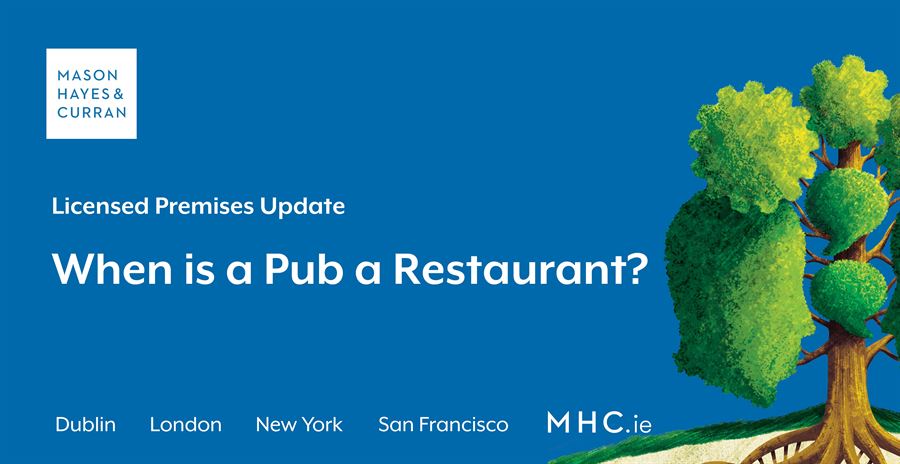
Since our last article, there have been some interesting developments including the introduction of a phased lifting of restrictions.
Reminder of important dates:
29 June 2020 - Restaurants and cafes may open
20 July 2020 – Hotels and hostels may open (but hotel bars must stay closed)
10 August 2020 – Pubs, hotel bars and cinemas may open
When is a Pub a Restaurant?
The holder of a valid publican’s licence (or other valid on-licence) may apply to its local District Court for a restaurant certificate. If granted, the licensed premises which benefits from the restaurant certificate is then deemed under law to be a restaurant. The historic reason for applying for such a certificate is it allows the licence holder to serve alcohol with a meal for an additional hour outside of the permitted hours for the sale of alcohol.
In the context of the proposed re-opening dates, this certificate once obtained would arguably permit a pub or other licensed premises open on 29 June 2020 as opposed to 10 August 2020. This would be on the basis that the licensed premises is serving food and alcohol in accordance with its restaurant certificate. It is understood that at least half of the pubs in Dublin intend to open and trade on 29 June on foot of their restaurant certificates.
Pros and Cons
From an economic perspective, owners of licensed premises need to trade as soon as possible to keep their businesses alive and to maintain their staff. This would also benefit the economy and reduce the number of businesses currently drawing on the Wage Subsidy Scheme and improve unemployment numbers. It would also help alleviate the social and mental fatigue which has affected people across the country since lockdown began by providing new social venues.
On the other side, the Government is dealing with a situation that is extremely difficult to predict and is regularly introducing new measures to tackle the virus to avoid a second wave. This could mean pushing out reopening dates if infections increase or possibly bringing forward those dates if results are positive (or permit reopening subject to new restrictions).
Social Distancing
From a commercial perspective, social distancing means less customers, which will impact revenues.
Businesses are still waiting for guidelines on what they need to do and what modifications they need to make to ensure they comply with the restrictions being introduced. The preparation of these guidelines is a challenge for the Government and the HSE to ensure they work in practice where commercial premises often differ in size, location and footfall. A balance will have to be achieved where social distancing guidelines protect the public but also do not decimate trade for any particular business, where possible.
Reducing the distancing requirement from 2 metres to 1 metre would make a huge difference for most licensed premises around the country. Again, this is subject to the medical advice the Government receives at any point in time on foot of changing circumstances.
Alterations to licensed premises will no doubt cost money and take time. Commercial tenants should also consider if landlord consent is required under their lease and obtain legal advice prior to carrying out any alterations to avoid any breach.
There are positive measures already available which can help businesses prepare to re-open. A Restart Grant was introduced on 22 May which can be applied for by businesses to their local authority where their annual revenue does not exceed €5m. Other grants and consultancy services are available from Fáilte Ireland and other stakeholder bodies.
Law & Order
To date there has been no legislation enacted governing the rules of the phased openings – just recommendations and guidelines, which the Government expects businesses to follow to maintain the safety of the public.
There has been discussion in recent media articles of a potential ban on the right to sell alcohol at licensed premises that seek to open and trade as restaurants. If such a ban is introduced, it will have a similar effect to restricting publicans to opening on 10 August 2020, as it may not be economically viable for certain publicans / owners of licensed premises to open to sell food and non-alcoholic beverages and/or off-sales only at a profit, depending on labour costs and overheads.
If publicans open as restaurants, could this prejudice them when they seek to renew their liquor licence in September 2020? It will depend on whether the guidelines change or new legislation is introduced between now and 29 June. The Gardai could decide to actively object in the District Court to the renewal of licences by licence holders who did not comply with the recommended steps during the crisis. It would then be up to the District Court Judge in each case to determine whether a liquor licence can be renewed.
Other practical considerations
It is not clear if commercial rates will immediately become payable for businesses which reopen on the relevant phased dates. As of the date of this article, a three month waiver of commercial rates is in effect from 27 March 2020 for eligible businesses. There are strong arguments to say businesses need time to get back on their feet so a further transitional period where rates are waived may be appropriate.
There has also been a call for the VAT rate to be reduced to 9% or below for 2020 to facilitate the recovery, which has yet to be introduced. This would be another positive measure to help businesses in the licensed trade and hospitality sectors get back on their feet.
Conclusion
The Government faces the challenge of delicately balancing the interests of business owners and stakeholders in the licensed trade industry while protecting the public – and in the context of pent up demand for socialising to resume.
We are in a key phase where the sharing of information and ideas between the Government and business owners, including bodies such as the Licensed Vintners Association, Vintners Federation of Ireland, Irish Hotels Federation and Restaurants Association of Ireland, is essential to ensure that when measures are next introduced that they do help businesses get back on their feet and start trading, but in a responsible way bearing in mind the safety of the public.
The Irish economy relies on the licensed trade sector for tourism and to maintain healthy levels of employment, which, when up and running again, will have positive knock-on effects for many other sectors.
We have acted for a number of publicans and owners of licensed premises in successfully obtaining all manner of liquor licences including restaurant certificates.





